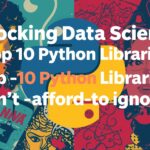The healthcare industry is experiencing one of the biggest transformations in its history—thanks to Artificial Intelligence (AI). From detecting diseases earlier to developing new drugs and offering personalized treatments, AI in healthcare is not just a futuristic vision anymore—it is already saving lives in 2025.
However, with such massive potential comes responsibility. AI brings efficiency and precision, but it also raises important ethical, privacy, and cost-related challenges.
In this detailed guide, we’ll explore:
What AI in healthcare really means
Why it’s revolutionizing medicine
Real-world applications of AI in hospitals, research, and patient care
Benefits, challenges, and risks
The future of AI in healthcare beyond 2025
How you can build a career in AI healthcare
What is Artificial Intelligence in Healthcare?
Artificial Intelligence in healthcare refers to the use of algorithms, machine learning models, and data-driven systems that mimic human intelligence to assist doctors, researchers, and patients.
Instead of replacing doctors, AI acts as a support system—helping healthcare professionals make faster, more accurate decisions by analyzing vast amounts of data that humans cannot process quickly.
In simple terms:
Doctors + AI = Better Healthcare
Key Technologies Behind AI in Healthcare
Machine Learning (ML): Detects patterns in medical data.
Natural Language Processing (NLP): Reads and interprets medical records and research papers.
Computer Vision: Analyzes X-rays, MRIs, and CT scans.
Robotics: Assists in surgeries and patient care.
Predictive Analytics: Forecasts disease risks and treatment outcomes.
Why AI is Transforming Medicine
Healthcare generates an enormous amount of data daily: medical records, lab test results, clinical trials, imaging scans, wearable device outputs, and research studies.
The Problem:
Human doctors cannot process terabytes of medical data in real time.
This leads to delays in diagnosis, limited treatment personalization, and high healthcare costs.
The Solution:
AI analyzes massive datasets in seconds.
It detects hidden patterns that even experienced doctors may miss.
Provides actionable insights that speed up diagnosis and improve treatment outcomes.
This is why AI in medicine is considered a game-changer—making healthcare more efficient, accurate, and accessible.
Real-World Applications of AI in Healthcare
1. AI in Medical Imaging & Diagnostics
Medical imaging is one of the most successful fields for AI adoption.
AI can read X-rays, MRIs, CT scans, and mammograms faster and sometimes more accurately than human radiologists.
For example, Google’s DeepMind AI has demonstrated the ability to spot breast cancer in scans with higher accuracy than radiologists.
AI-powered diagnostic tools are also used to detect lung cancer, heart disease, and brain tumors at earlier stages.
SEO Keyword Tip: “AI in medical imaging”, “AI diagnostics in healthcare”
2. AI for Drug Discovery & Development
Traditional drug discovery takes 10–15 years and costs billions.
AI reduces this timeline dramatically by:
Predicting which chemical compounds are most effective.
Simulating drug interactions using machine learning models.
Identifying potential side effects before clinical trials.
Real Example: During the COVID-19 pandemic, AI helped researchers identify potential treatments in record time, proving how valuable AI is in emergency scenarios.
3. Virtual Health Assistants & AI Chatbots
AI-powered chatbots and virtual assistants provide:
24/7 medical advice.
Symptom checking.
Appointment scheduling.
Medication reminders.
Example: The Babylon Health app offers AI-driven health consultations and symptom analysis, reducing the burden on hospitals and clinics.
4. Predictive Analytics for Patient Care
AI predicts a patient’s likelihood of developing chronic diseases (like diabetes, stroke, or heart attack).
Hospitals use AI to:
Reduce readmission rates.
Monitor patients remotely using wearable devices.
Identify high-risk patients early.
5. Robotic Surgeries
AI-powered surgical robots assist doctors in performing minimally invasive surgeries with precision.
The Da Vinci Surgical System is already in use globally, enabling surgeons to perform delicate procedures with robotic assistance.
Benefits: smaller incisions, reduced recovery time, fewer complications.
6. Personalized Treatment Plans
AI customizes treatments based on:
Genetic data
Lifestyle factors
Patient history
For example, in cancer treatment, AI uses genomic data to recommend personalized therapies that increase survival rates.
7. AI in Hospital Operations & Management
AI also improves hospital efficiency by:
Managing staff scheduling.
Optimizing patient flow.
Reducing waiting times.
Enhancing resource allocation.
This ensures better healthcare delivery without overwhelming medical staff.
Benefits of AI in Healthcare
Faster & more accurate diagnoses
Lower healthcare costs by reducing inefficiencies
Personalized treatment for every patient
Early detection of diseases like cancer, diabetes, and heart disease
Better patient experience with chatbots and automation
Medical research acceleration
Challenges & Risks of AI in Healthcare
While the benefits are huge, AI adoption faces serious challenges:
1. Data Privacy & Security
Patient medical data is highly sensitive.
Any data breach could have severe consequences.
2. Algorithmic Bias
If AI is trained on biased datasets, it may lead to incorrect or unfair diagnoses.
3. High Cost of Implementation
AI systems are expensive.
Small hospitals struggle to afford advanced AI solutions.
4. Ethical Concerns
Who is responsible if AI makes a wrong diagnosis—the doctor or the AI developer?
Ethical frameworks are still being developed.
5. Doctor–AI Collaboration
Doctors must trust AI but remain the final decision-makers.
Proper training and guidelines are needed.
Future of AI in Healthcare (2025 & Beyond)
AI is evolving rapidly. By the late 2020s, we can expect:
AI-driven wearable devices monitoring real-time health data.
AI chatbots for mental health support offering therapy sessions.
AI in genomics predicting hereditary diseases.
Global telemedicine powered by AI making healthcare accessible everywhere.
Fully automated robotic surgeries with minimal human intervention.
How to Start a Career in AI Healthcare
The demand for AI healthcare experts is growing in 2025.
Skills to Learn:
Programming: Python, R
ML/DL Frameworks: TensorFlow, PyTorch
Healthcare Data: Electronic Health Records (EHRs), Medical Imaging Data
Statistics & Data Science
Knowledge of medical terminology
Steps to Build a Career:
Take online courses in AI & healthcare (Coursera, edX, Udacity).
Work on projects: diagnostic models, AI chatbots, predictive analytics tools.
Collaborate with doctors and researchers for real-world exposure.
Build a portfolio showcasing AI applications in medicine.
Conclusion
AI in healthcare is not here to replace doctors—it’s here to empower them.
With AI, we’re entering a future where:
Diseases are detected earlier.
Treatments are personalized.
Healthcare becomes more accessible and efficient.
However, challenges around privacy, ethics, and trust must be addressed to ensure that AI fulfills its promise of improving lives without creating new risks.
For patients, doctors, researchers, and innovators, the future of AI in healthcare is bright, exciting, and life-saving.
FAQs on AI in Healthcare
Q1: How is AI used in hospitals today?
AI is used for diagnostics, hospital management, predictive analytics, chatbots, and robotic surgeries.
Q2: Can AI replace doctors?
No. AI supports doctors but cannot replace human judgment, empathy, and experience.
Q3: What is the biggest challenge of AI in healthcare?
The biggest challenges are data privacy and building trust in AI-powered decisions.
Q4: Which companies are leading AI healthcare innovation?
Google DeepMind
IBM Watson Health
Siemens Healthineers
Philips AI Healthcare

